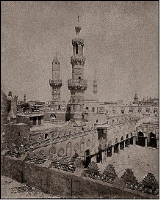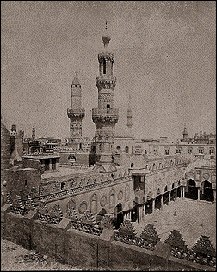
Jawhar as-Siqilli
Encyclopedia
Gawhar al-Siqilli (born c. 928-930, died 992) (Arabic: جوهر الصقلي) also called al-Rumi (the Greek) main transliteration
: Gawhar as-Siqilli al-Rumi was the most important military leader in the Fatimid
history. He led the conquest of North Africa and then of Egypt, founded the city of Cairo
and the great al-Azhar mosque
.
of Greek
ethnicity. His family originated from the Emirate of Sicily
(hence the epithet الصقلي = the Sicilian), and came as a slave to North Africa
. He was sent to the Caliph
Ismail al-Mansur
on account of his intelligence and cunning. Under his son al-Muizz
(953-975) he gained his freedom and became his personal secretary. Soon he was Vizir and the highest-ranking military commander of the Fatimids. In this role he resumed the expansion of the Fatimids and, together with the Zirids, conquered Fez in Northern Morocco
, and pushed towards the Atlantic. Only the strongholds of Ceuta
and Tangier
could be retained by the Umayyads of Córdoba.
 After the Western borders had been secured, Gawhar as-Siqilli pushed towards Egypt and occupied the land around the Nile from the Ikhshidids after a siege at Giza. The conquest was prepared by a treaty with the Vizir of the Ikhshidids (by which Sunnis would be guaranteed freedom of religion), so the Fatimids encountered little resistance. Afterwards Gawhar ruled Egypt until 972 as viceroy.
After the Western borders had been secured, Gawhar as-Siqilli pushed towards Egypt and occupied the land around the Nile from the Ikhshidids after a siege at Giza. The conquest was prepared by a treaty with the Vizir of the Ikhshidids (by which Sunnis would be guaranteed freedom of religion), so the Fatimids encountered little resistance. Afterwards Gawhar ruled Egypt until 972 as viceroy.
In this capacity he founded the city of Cairo
on 969 north of Fostat
, to serve as the new residence of the Fatimid Caliphs, and the al-Azhar mosque
on 970. Although Palestine
was occupied after the conquest of Egypt, Syria
could not be overcome, following a defeat at the hands of the Carmathians at Damascus
. However, when the Carmatians overran Egypt, Gawhar was able to defeat them north of Cairo on the 22 December 970, although the struggle continued until 974. To secure the southern border of Egypt a legation was sent to the Christian land of Nubia
.
After the establishment of the residence at Cairo, Gawhar fell into disfavour with al-Muizz. Under his successor al-Aziz (975-996) however, in whose accession to the throne Gawhar played an important role, he was rehabilitated. He was regent again until 979, but was finally stripped of power after a campaign against Syria was once again defeated near Damascus. Gawhar died on February 1, 992.
Transliteration
Transliteration is a subset of the science of hermeneutics. It is a form of translation, and is the practice of converting a text from one script into another...
: Gawhar as-Siqilli al-Rumi was the most important military leader in the Fatimid
Fatimid
The Fatimid Islamic Caliphate or al-Fāṭimiyyūn was a Berber Shia Muslim caliphate first centered in Tunisia and later in Egypt that ruled over varying areas of the Maghreb, Sudan, Sicily, the Levant, and Hijaz from 5 January 909 to 1171.The caliphate was ruled by the Fatimids, who established the...
history. He led the conquest of North Africa and then of Egypt, founded the city of Cairo
Cairo
Cairo , is the capital of Egypt and the largest city in the Arab world and Africa, and the 16th largest metropolitan area in the world. Nicknamed "The City of a Thousand Minarets" for its preponderance of Islamic architecture, Cairo has long been a centre of the region's political and cultural life...
and the great al-Azhar mosque
Al-Azhar Mosque
Al-Azhar Mosque is a mosque in Islamic Cairo in Egypt. Al-Mu‘izz li-Dīn Allāh of the Fatimid Caliphate commissioned its construction for the newly established capital city in 970. Its name is usually thought to allude to the Islamic prophet Muhammad's daughter Fatimah, a revered figure in Islam...
.
Biography
Gawhar was a Sicilian MamlukMamluk
A Mamluk was a soldier of slave origin, who were predominantly Cumans/Kipchaks The "mamluk phenomenon", as David Ayalon dubbed the creation of the specific warrior...
of Greek
Greeks
The Greeks, also known as the Hellenes , are a nation and ethnic group native to Greece, Cyprus and neighboring regions. They also form a significant diaspora, with Greek communities established around the world....
ethnicity. His family originated from the Emirate of Sicily
Emirate of Sicily
The Emirate of Sicily was an Islamic state on the island of Sicily , which existed from 965 to 1072.-First Arab invasions of Sicily:...
(hence the epithet الصقلي = the Sicilian), and came as a slave to North Africa
North Africa
North Africa or Northern Africa is the northernmost region of the African continent, linked by the Sahara to Sub-Saharan Africa. Geopolitically, the United Nations definition of Northern Africa includes eight countries or territories; Algeria, Egypt, Libya, Morocco, South Sudan, Sudan, Tunisia, and...
. He was sent to the Caliph
Caliph
The Caliph is the head of state in a Caliphate, and the title for the ruler of the Islamic Ummah, an Islamic community ruled by the Shari'ah. It is a transcribed version of the Arabic word which means "successor" or "representative"...
Ismail al-Mansur
Ismail al-Mansur
Ismāʿīl al-Manṣūr was the third Caliph of the Fatimids in Ifriqiya .- History :Ismāʿīl was born in 913 in Raqqada near Kairouan and succeeded his father Abū l-Qāṣim al-Qā'im in 946. The Fatimid realm found itself deep in crisis due to the revolt of Abū Yazīd...
on account of his intelligence and cunning. Under his son al-Muizz
Ma'ad al-Muizz Li-Deenillah
Ma‘ādh Abū Tamīm al-Mu‘izz li Dīn Allāh , also known as al-Moezz, was the fourth Fatimid Caliph and 14th Ismaili imam, and reigned from 953 to 975. It was during his caliphate that the center of power of the Fatimid dynasty was moved from Ifriqiya to the newly conquered Egypt...
(953-975) he gained his freedom and became his personal secretary. Soon he was Vizir and the highest-ranking military commander of the Fatimids. In this role he resumed the expansion of the Fatimids and, together with the Zirids, conquered Fez in Northern Morocco
Morocco
Morocco , officially the Kingdom of Morocco , is a country located in North Africa. It has a population of more than 32 million and an area of 710,850 km², and also primarily administers the disputed region of the Western Sahara...
, and pushed towards the Atlantic. Only the strongholds of Ceuta
Ceuta
Ceuta is an autonomous city of Spain and an exclave located on the north coast of North Africa surrounded by Morocco. Separated from the Iberian peninsula by the Strait of Gibraltar, Ceuta lies on the border of the Mediterranean Sea and the Atlantic Ocean. Ceuta along with the other Spanish...
and Tangier
Tangier
Tangier, also Tangiers is a city in northern Morocco with a population of about 700,000 . It lies on the North African coast at the western entrance to the Strait of Gibraltar where the Mediterranean meets the Atlantic Ocean off Cape Spartel...
could be retained by the Umayyads of Córdoba.

In this capacity he founded the city of Cairo
Cairo
Cairo , is the capital of Egypt and the largest city in the Arab world and Africa, and the 16th largest metropolitan area in the world. Nicknamed "The City of a Thousand Minarets" for its preponderance of Islamic architecture, Cairo has long been a centre of the region's political and cultural life...
on 969 north of Fostat
Fostat
Fustat , was the first capital of Egypt under Arab rule...
, to serve as the new residence of the Fatimid Caliphs, and the al-Azhar mosque
Al-Azhar Mosque
Al-Azhar Mosque is a mosque in Islamic Cairo in Egypt. Al-Mu‘izz li-Dīn Allāh of the Fatimid Caliphate commissioned its construction for the newly established capital city in 970. Its name is usually thought to allude to the Islamic prophet Muhammad's daughter Fatimah, a revered figure in Islam...
on 970. Although Palestine
Palestine
Palestine is a conventional name, among others, used to describe the geographic region between the Mediterranean Sea and the Jordan River, and various adjoining lands....
was occupied after the conquest of Egypt, Syria
Syria
Syria , officially the Syrian Arab Republic , is a country in Western Asia, bordering Lebanon and the Mediterranean Sea to the West, Turkey to the north, Iraq to the east, Jordan to the south, and Israel to the southwest....
could not be overcome, following a defeat at the hands of the Carmathians at Damascus
Damascus
Damascus , commonly known in Syria as Al Sham , and as the City of Jasmine , is the capital and the second largest city of Syria after Aleppo, both are part of the country's 14 governorates. In addition to being one of the oldest continuously inhabited cities in the world, Damascus is a major...
. However, when the Carmatians overran Egypt, Gawhar was able to defeat them north of Cairo on the 22 December 970, although the struggle continued until 974. To secure the southern border of Egypt a legation was sent to the Christian land of Nubia
Nubia
Nubia is a region along the Nile river, which is located in northern Sudan and southern Egypt.There were a number of small Nubian kingdoms throughout the Middle Ages, the last of which collapsed in 1504, when Nubia became divided between Egypt and the Sennar sultanate resulting in the Arabization...
.
After the establishment of the residence at Cairo, Gawhar fell into disfavour with al-Muizz. Under his successor al-Aziz (975-996) however, in whose accession to the throne Gawhar played an important role, he was rehabilitated. He was regent again until 979, but was finally stripped of power after a campaign against Syria was once again defeated near Damascus. Gawhar died on February 1, 992.

